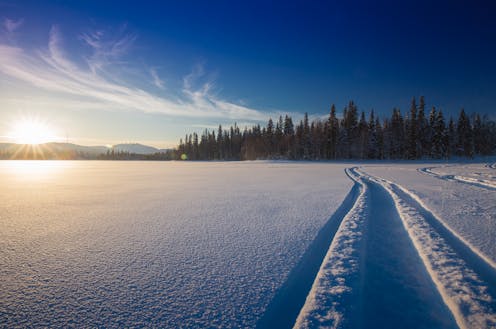Source: The Conversation (Au and NZ) – By Joelle Gergis, Senior Lecturer in Climate Science, Australian National University

Around half of all life on Earth is on the move because of climate change, according to the Intergovernmental Panel on Climate Change (IPCC). Many species’ habitats are changing, forcing them to move, while others are fleeing harm’s way as new predators move in.
This staggering statistic shows just one of the ways climate change is impacting species at both ends of the Earth. In this week’s episode of The Conversation’s climate podcast Fear & Wonder, we travel from the Arctic to Tasmania to see how these changes are playing out.
The second volume of the IPCC’s monumental Sixth Assessment Report assesses the impacts, adaptation and vulnerability of people and ecosystems to global warming, including how animals and plants are responding to a changing climate.
In this episode, we speak to Finnish fisherman and IPCC scientist Tero Mustonen about the changes he has observed on the lake ice in his village of Selkie in North Karelia, and how his community has led a successful rewilding project on a nearby peatland mining site.
Read more:
Introducing Fear and Wonder: The Conversation’s new climate podcast
We also hear from Australian marine ecologist and IPCC author Gretta Pecl, whose research has helped map the rapid redistribution of life on Earth. Through her dives off the Tasmanian coast, we learn how species are shifting their distribution faster in the ocean than they are on land.
To listen and subscribe, click here, or click the icon for your favourite podcast app in the graphic above.
If you’re enjoying Fear & Wonder, be sure to join us for a live bonus episode at 1pm on May 1. Details here.
Fear and Wonder is sponsored by the Climate Council, an independent, evidence-based organisation working on climate science, impacts and solutions.
![]()
Dr Joelle Gergis has received funding from the Australian Research Council and the Australian Government’s Department of Industry, Science, Energy and Resources in the past. She currently receives funding from the Australian National University.
Michael Green does not work for, consult, own shares in or receive funding from any company or organisation that would benefit from this article, and has disclosed no relevant affiliations beyond their academic appointment.
– ref. Fear and Wonder podcast: how species are responding to climate change – and how humans can help – https://theconversation.com/fear-and-wonder-podcast-how-species-are-responding-to-climate-change-and-how-humans-can-help-204359




